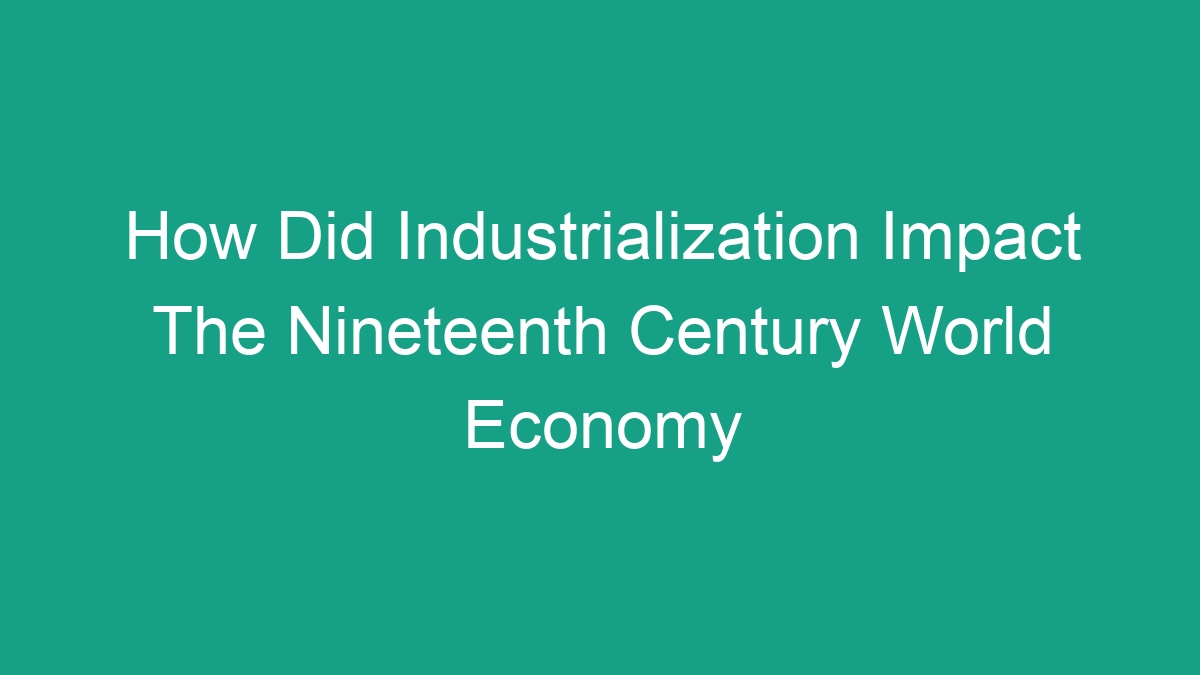
Introduction
The nineteenth century witnessed a significant transformation in the world economy due to the phenomenon of industrialization. Industrialization refers to the process of moving from an agrarian and handicraft economy to one dominated by industry and machine manufacturing. This period brought about unprecedented changes in technology, production, transportation, and economic systems. Industrialization had a profound impact on the world economy in the nineteenth century, shaping the global landscape in ways that continue to resonate today.
Industrial Revolution and Global Economic Transformation
The Industrial Revolution, which spanned from around 1760 to 1840, is often considered the starting point of industrialization. It originated in Britain and later spread to other parts of Europe and the United States. The adoption of new technologies, such as steam power, mechanized manufacturing, and the use of iron and steel, led to a massive increase in production and efficiency. This resulted in the creation of factories, urbanization, and a shift from agrarian-based economies to industrial ones.
The impact of the Industrial Revolution on the world economy cannot be overstated. It marked a turning point in human history, accelerating economic growth and leading to widespread social and cultural changes. The increased production capacity and efficiency brought about by industrialization led to a surge in global trade and the creation of new markets for goods. As a result, the world economy began to expand and interconnect in ways never seen before.
Growth of International Trade and Commerce
One of the most significant impacts of industrialization on the nineteenth-century world economy was the exponential growth of international trade and commerce. The increase in production capacity, coupled with improved transportation infrastructure such as railways and steamships, meant that goods could be produced, transported, and sold on a scale never before possible.
This led to the emergence of a truly global economy, with goods being exchanged across continents at an unprecedented rate. The rise of international trade led to the creation of new markets and economic opportunities, as well as increased competition between nations. This period saw the establishment of trade routes, the development of new industries, and the consolidation of economic power in certain countries.
Expansion of Colonialism and Imperialism
Industrialization also had a profound impact on the expansion of colonialism and imperialism in the nineteenth century. As industrialized nations such as Britain, France, and Germany sought to secure raw materials and new markets for their manufactured goods, they turned to the practice of colonialism. This involved the establishment of colonies in Africa, Asia, and the Americas, with the aim of exploiting their resources and labor for the benefit of the imperial powers.
Industrialization fueled the expansion of colonial empires, as the demand for raw materials such as cotton, rubber, and minerals grew exponentially. The colonies became integral to the global economy, serving as a source of cheap labor and raw materials for the industrialized nations. In turn, this led to the creation of a hierarchical global economic system, with the industrialized nations at the top and their colonies serving as sources of wealth and resources.
Shift in Economic Power
The impact of industrialization on the world economy also led to a significant shift in economic power. Prior to the Industrial Revolution, economic power was largely concentrated in agrarian-based economies, such as China and India. However, as industrialization took hold in Europe and the United States, these countries emerged as the new centers of economic power, overshadowing the traditional economic powers.
The shift in economic power had far-reaching consequences for the global economy. Industrialized nations were able to leverage their technological advancements and production capabilities to dominate global trade and establish themselves as economic powerhouses. This shift also led to increased competition between nations, as they vied for access to markets and resources, leading to conflicts and wars over economic dominance.
Creation of Urban Centers and Labor Markets
Another impact of industrialization on the world economy was the creation of urban centers and labor markets. The shift from agrarian-based economies to industrial ones led to a massive migration of people from rural areas to urban centers in search of employment in the new factories and industries. This led to the growth of cities and the establishment of labor markets, as a new class of industrial workers emerged.
The creation of urban centers and labor markets had profound social and economic implications. It led to the rise of industrial capitalism, with workers selling their labor for wages in the new industrial economy. This period also saw the emergence of labor movements and the push for workers’ rights and better working conditions, as the realities of industrialization led to exploitation and poor living and working conditions for many.
Conclusion
In conclusion, the impact of industrialization on the nineteenth century world economy was profound and far-reaching. It led to the expansion of international trade and commerce, the rise of colonialism and imperialism, a shift in economic power, and the creation of urban centers and labor markets. The effects of industrialization continue to shape the global economy to this day, highlighting its enduring significance in the annals of human history. As we continue to grapple with the consequences of industrialization, it is imperative to understand its impact on the world economy and strive to create a more equitable and sustainable global economic system.



